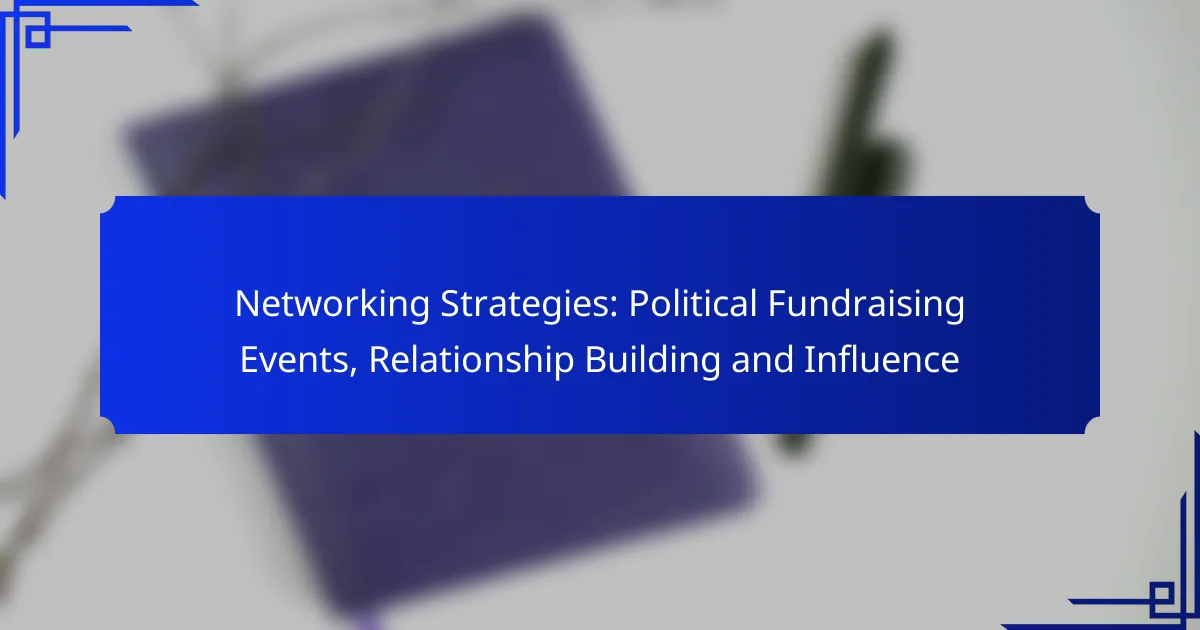Networking strategies in political fundraising events are essential for cultivating meaningful connections that can drive support and financial contributions. By focusing on personalized invitations, engaging activities, and effective follow-up, organizers can enhance attendee engagement and build lasting relationships that bolster political influence.
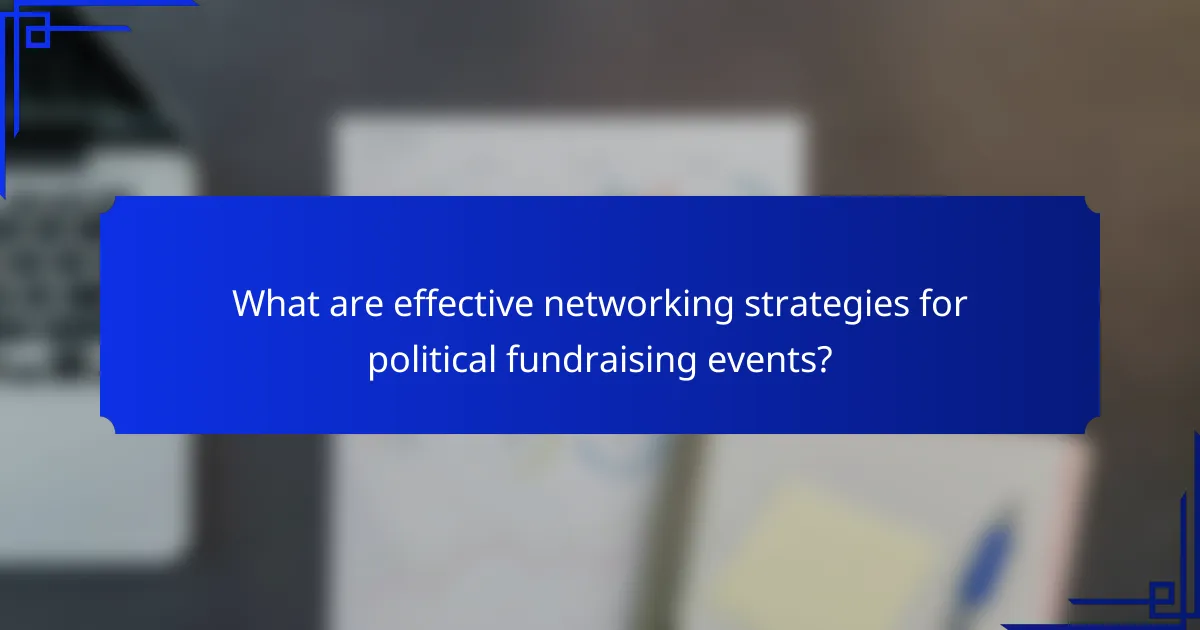
What are effective networking strategies for political fundraising events?
Effective networking strategies for political fundraising events focus on creating meaningful connections that can lead to increased support and contributions. By implementing personalized invitations, engaging guest speakers, interactive activities, and follow-up communication, organizers can enhance attendee engagement and foster lasting relationships.
Personalized invitations
Sending personalized invitations can significantly increase attendance and engagement at political fundraising events. Tailoring messages to reflect the recipient’s interests or past contributions shows appreciation and makes them feel valued. Consider using their name and referencing specific issues they care about to create a more inviting atmosphere.
Utilize various channels for invitations, such as email, social media, or even handwritten notes, depending on the relationship with the invitee. Aim for a response rate of at least 30-50% by following up with reminders as the event date approaches.
Engaging guest speakers
Inviting engaging guest speakers can elevate the appeal of your fundraising event and attract a broader audience. Select speakers who are influential in the political landscape or have compelling stories that resonate with your audience. Their presence can inspire attendees and encourage them to contribute more generously.
Consider a mix of local leaders, policy experts, or even celebrities who align with your cause. Ensure that their topics are relevant and provide value to the attendees, enhancing the overall experience and encouraging networking among guests.
Interactive activities
Incorporating interactive activities into your fundraising event can foster networking and create memorable experiences. Activities such as live polls, Q&A sessions, or small group discussions encourage participation and allow attendees to connect over shared interests.
Consider setting up networking stations where guests can engage in discussions about specific topics or issues. This approach not only breaks the ice but also promotes deeper conversations that can lead to stronger relationships and potential contributions.
Follow-up communication
Effective follow-up communication is crucial for maintaining relationships established during the fundraising event. Sending thank-you notes or personalized emails shortly after the event helps reinforce connections and shows appreciation for attendees’ support.
Consider scheduling follow-up calls or meetings to discuss ongoing initiatives or future events. This continued engagement can turn initial interactions into long-term relationships, ultimately benefiting your fundraising efforts and political goals.
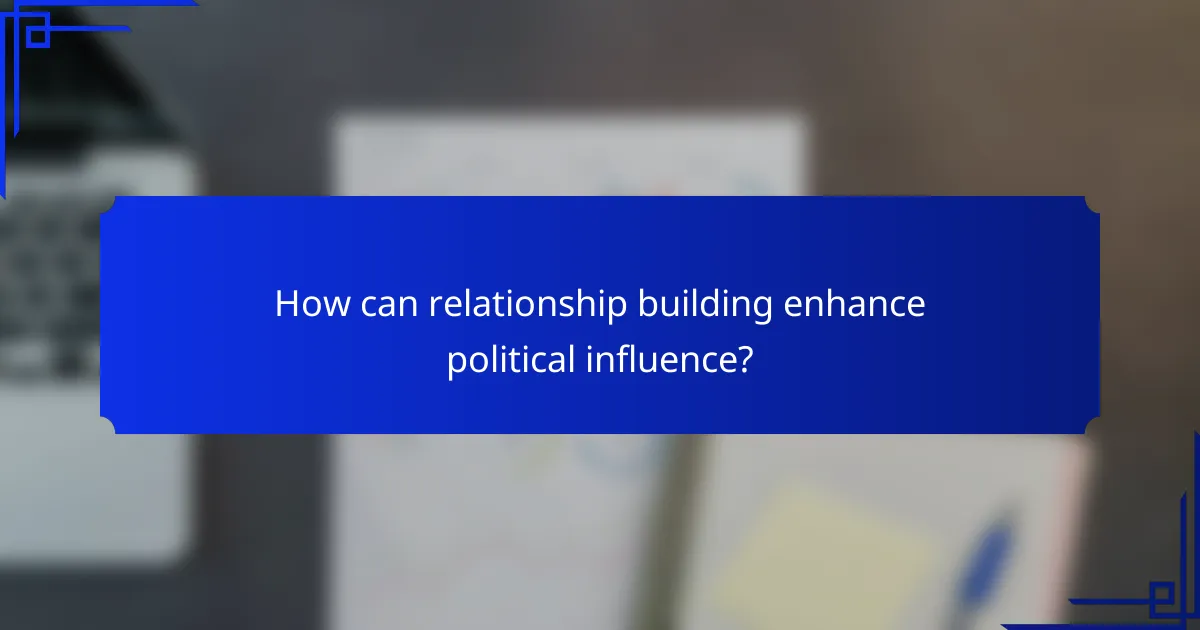
How can relationship building enhance political influence?
Relationship building is crucial for enhancing political influence as it fosters trust and collaboration among stakeholders. By developing strong connections, political figures can effectively advocate for their initiatives and mobilize support from various groups.
Building trust through transparency
Transparency is key to building trust in political relationships. When political figures openly share their intentions, decision-making processes, and financial disclosures, they create an environment where stakeholders feel valued and informed. This openness can lead to stronger alliances and increased support.
For example, hosting regular town hall meetings where constituents can ask questions and express concerns can significantly enhance transparency. This practice not only builds trust but also encourages active participation from the community.
Regular engagement with stakeholders
Consistent engagement with stakeholders is essential for maintaining strong political relationships. Regular communication, whether through newsletters, social media updates, or in-person events, keeps stakeholders informed and involved. This ongoing dialogue helps to reinforce connections and ensures that political figures remain attuned to the needs and concerns of their constituents.
Consider scheduling quarterly updates or informal gatherings to discuss progress on initiatives. This approach allows stakeholders to feel included in the political process and fosters a sense of ownership over local issues.
Leveraging social media platforms
Social media platforms are powerful tools for relationship building in politics. They provide a direct line of communication between political figures and the public, allowing for immediate feedback and interaction. By actively engaging on platforms like Twitter, Facebook, or Instagram, politicians can share their messages, respond to constituents, and build a loyal following.
Utilizing social media effectively involves posting regular updates, engaging with comments, and sharing relevant content that resonates with the audience. This strategy not only enhances visibility but also strengthens the connection between politicians and their supporters.
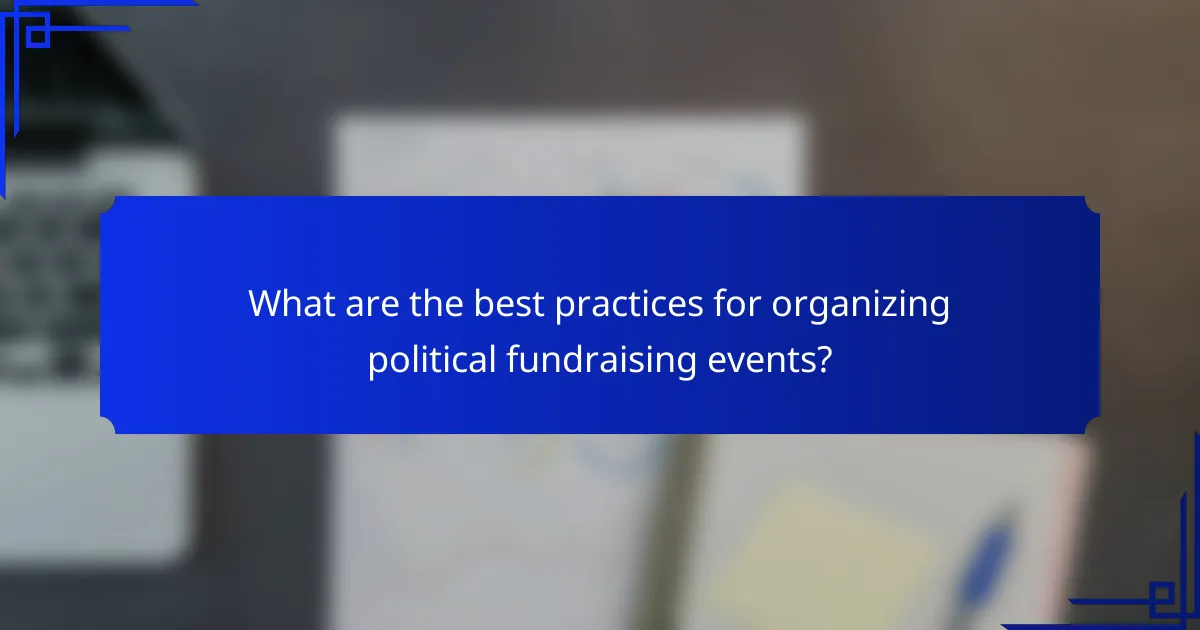
What are the best practices for organizing political fundraising events?
Effective political fundraising events require careful planning and execution to maximize engagement and contributions. Key practices include setting clear objectives, selecting an appropriate venue, and designing an engaging agenda that resonates with attendees.
Setting clear goals
Establishing clear goals is crucial for any political fundraising event. Goals should be specific, measurable, achievable, relevant, and time-bound (SMART). For instance, aim to raise a certain amount of funds or increase donor engagement by a specific percentage.
Consider the target audience and their motivations. Understanding what drives your attendees can help tailor your goals and ensure that they align with their interests and values.
Choosing the right venue
The venue plays a significant role in the success of a fundraising event. Select a location that is accessible and comfortable for your target audience, whether it’s a community hall, a hotel, or an outdoor space. Consider factors such as capacity, amenities, and ambiance.
Additionally, evaluate the costs associated with the venue. Ensure that the expenses fit within your budget while still allowing for a professional and inviting atmosphere. A well-chosen venue can enhance the overall experience and encourage higher contributions.
Creating a compelling agenda
A compelling agenda keeps attendees engaged and encourages participation. Start with a strong opening that highlights the purpose of the event and the impact of their contributions. Include a mix of speeches, presentations, and interactive activities to maintain interest.
Incorporate opportunities for networking and relationship building, as these are essential for political fundraising. Allow time for Q&A sessions and discussions to foster connections among attendees, which can lead to future support and collaboration.
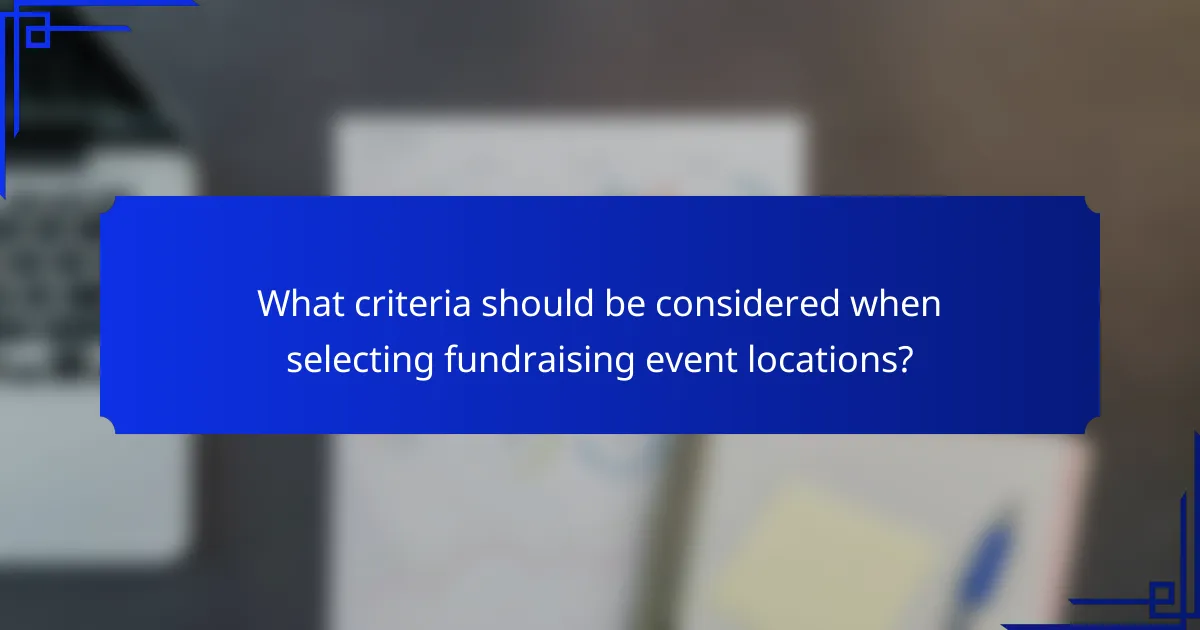
What criteria should be considered when selecting fundraising event locations?
When selecting fundraising event locations, consider factors such as accessibility, capacity, facilities, and the overall atmosphere. These elements can significantly impact attendee experience and the event’s success.
Accessibility for attendees
Accessibility is crucial for ensuring all potential attendees can participate. Consider locations that are easily reachable by public transport and have ample parking options. Additionally, venues should comply with local regulations regarding accessibility for individuals with disabilities.
Evaluate the physical layout of the venue. Features like ramps, elevators, and accessible restrooms enhance the experience for everyone. Aim for locations that are centrally located to attract a wider audience.
Capacity and facilities
Capacity refers to the number of attendees a venue can comfortably accommodate. Ensure the location can handle your expected guest list without feeling overcrowded. A good rule of thumb is to allow for about 10-15 square feet per attendee to ensure comfort.
Facilities should include essential amenities such as audio-visual equipment, catering options, and restrooms. Check if the venue offers in-house services or if you need to hire external vendors. This can affect your overall budget and planning timeline.
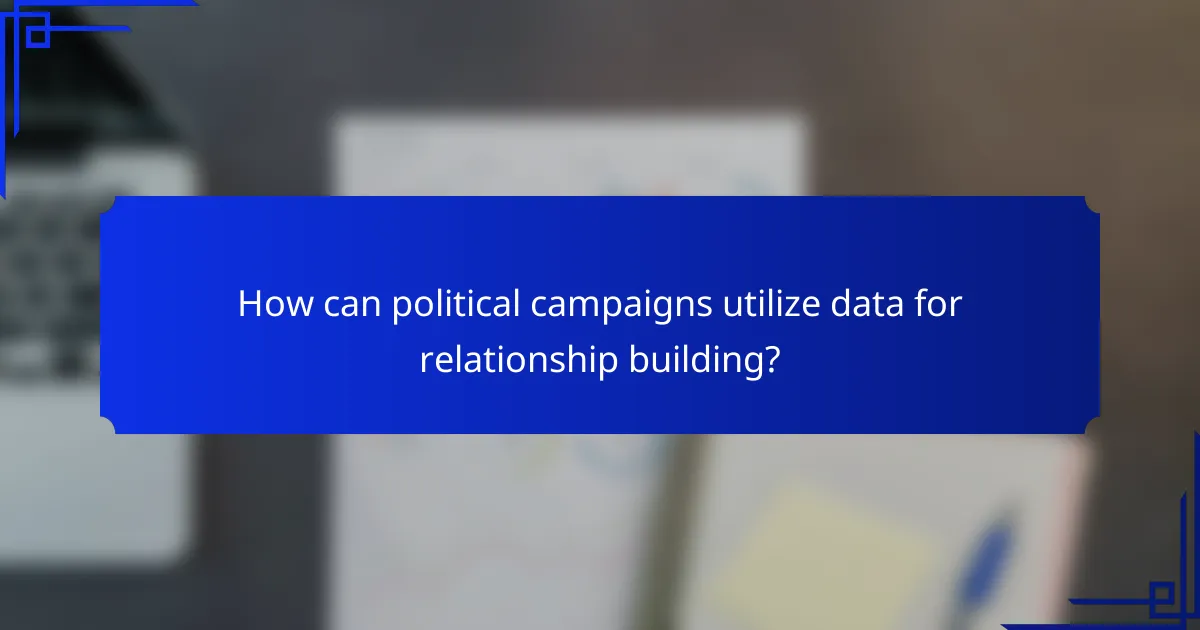
How can political campaigns utilize data for relationship building?
Political campaigns can leverage data to enhance relationship building by identifying key voter demographics and tailoring communication strategies accordingly. By analyzing data, campaigns can foster stronger connections with constituents, leading to increased engagement and support.
Voter segmentation analysis
Voter segmentation analysis involves categorizing voters based on shared characteristics such as demographics, interests, and voting behavior. This process allows campaigns to tailor their messaging and outreach efforts to resonate with specific groups, enhancing the effectiveness of their communication.
For example, a campaign might identify young voters in urban areas as a key segment and develop targeted social media campaigns that address issues relevant to them, such as education and job opportunities. Utilizing tools like surveys and voter databases can help refine these segments.
Tracking engagement metrics
Tracking engagement metrics is crucial for understanding how voters interact with campaign messages and events. Metrics such as email open rates, social media interactions, and event attendance provide insights into voter interests and preferences.
Campaigns should regularly analyze these metrics to adjust their strategies. For instance, if a particular message receives high engagement, it may indicate a strong interest in that topic, prompting further exploration or emphasis in future communications. Regularly reviewing these metrics can help avoid common pitfalls, such as over-saturating voters with less effective messaging.
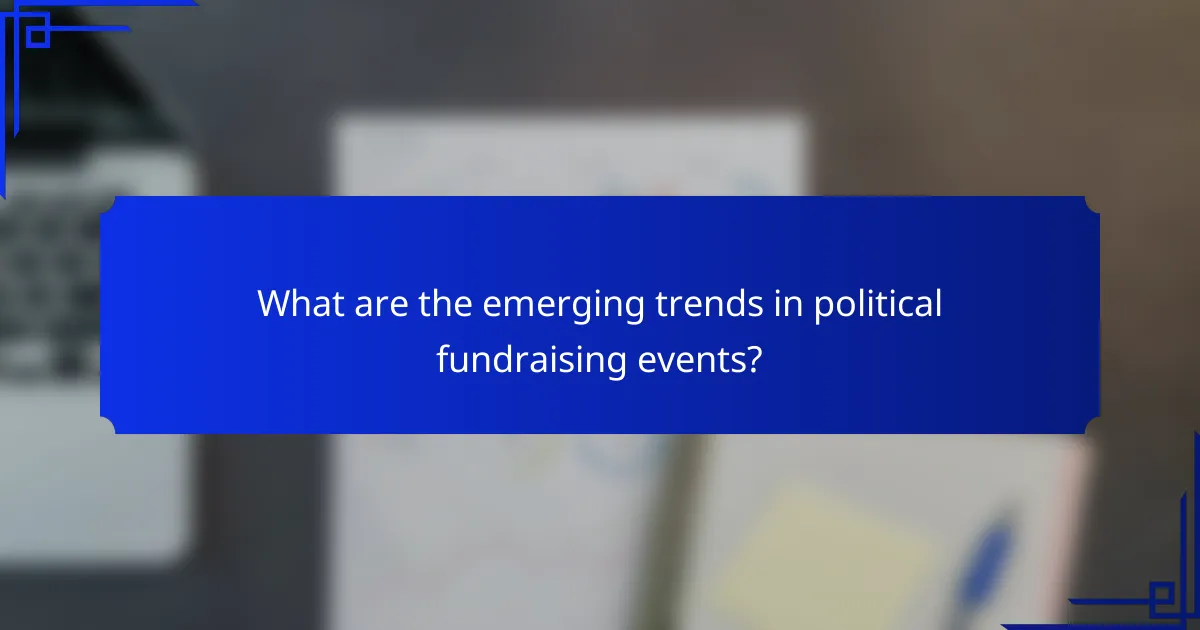
What are the emerging trends in political fundraising events?
Emerging trends in political fundraising events include a shift towards virtual and hybrid formats, increased use of data analytics, and a focus on personalized engagement. These trends reflect the need for adaptability and innovation in reaching potential donors effectively.
Virtual and hybrid events
Virtual and hybrid events have gained popularity due to their accessibility and cost-effectiveness. They allow candidates to reach a broader audience without geographical limitations, making it easier for supporters to participate from anywhere.
When organizing virtual events, consider using platforms that facilitate interaction, such as live Q&A sessions or breakout rooms. This engagement can enhance the attendee experience and foster a sense of community among supporters.
However, ensure that your technology is reliable and user-friendly to avoid technical issues during the event. Promote the event well in advance and provide clear instructions for participation to maximize attendance and engagement.
